2020 in Review: an interesting year for Skeptical Science
Posted on 29 December 2020 by BaerbelW
As we wrap up a truly interesting year 2020 and prepare for 2021, here is our annual review of what our team was up to during the last 12 months, most of which have obviously been dominated by the COVID-19 pandemic. As in previous recaps, this one is divided into several sections:
|
Scholary publications, projects and books |
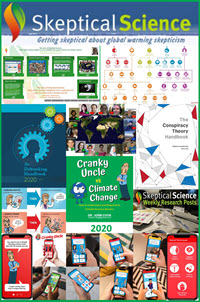 |
Scholarly publications, projects and books
Several members of the SkS-team were lead- or co-authors of peer-reviewed papers published during 2020. Here is a list of some of them:
Past warming trend constrains future warming in CMIP6 models
Katarzyna B. Tokarska, Martin B. Stolpe, Sebastian Sippel, Erich M. Fischer, Christopher J. Smith, Flavio Lehner, Reto Knutti (2020, March). Science advances, 6(12), eaaz9549.
The story of Skeptical Science: How citizen science helped to turn a website into a go-to resource for climate science
Bärbel Winkler & John Cook (2020, May). In EGU General Assembly Conference Abstracts(p. 562).
Using the COVID-19 economic crisis to frame climate change as a secondary issue reduces mitigation support
Ullrich Ecker, Lucy Butler, John Cook, Mark Hurlstone, Tim Kurz, & Stephan Lewandowsky (2020, August). Journal of Environmental Psychology, 70, 101464.
Structural barriers to scientific progress
Kevin Cowtan (2020, September). Acta Crystallographica Section D: Structural Biology, 76(10).
"[...] This letter was inspired by an apparently similar set of circumstances arising in two different fields. When a crystallographer started comparing climate data sets from national science agencies, the differences led rapidly to a number of insights which were not being pursued by more experienced practitioners (Cowtan & Way, 2014; Hausfather et al., 2017; Cowtan et al., 2018).[...]"
Pacific variability reconciles observed and modelled global mean temperature increase since 1950
Martin B. Stolpe, Kevin Cowtan, Iselin Medhaug & Reto Knutti (2020, October). Climate Dynamics, 1-22.
The story of Skeptical Science: How citizen science helped to turn a website into a go-to resource for climate science
Bärbel Winkler & John Cook (2020, December) Abstract (664284/SY043-15) presented at 2020 AGU Fall Meeting, 1-17 Dec. (iPoster)
Decoupled changes in upwelling and acidity in the eastern equatorial Pacific during the Pliocene
Madison Shankle, Natalie Burls, Alexey V Fedorov, Matthew David Thomas, Donald E Penman, Heather L Ford, Peter Jacobs, Noah Planavsky, Pincelli M Hull (2020, December). Abstract (672038/PP044-02) presented at 2020 AGU Fall Meeting, 1-17 Dec. (Recording)
Geographic extent and drivers of Pliocene Oxygen Minimum Zones
Catherine V Davis, Elizabeth C Sibert, Peter Jacobs, Natalie Burls, Andy Ridgwell, Pincelli M Hull (2020, December). Abstract (738824/PP044-04) presented at 2020 AGU Fall Meeting, 1-17 Dec. (Recording)
Foraminifera Species Distribution Models Inform Proxy Interpretation and Place Future Change in Geological Context
Peter Jacobs, Kim de Mutsert, Harry J Dowsett, Lukas Jonkers (2020, December). Abstract (734254/PP041-16) presented at 2020 AGU Fall Meeting, 1-17 Dec.
Introduction to climate science denial
John Cook (2020, December). In Holmes, D. & Richardson, L. M. (Eds.) Research Handbook on Communicating Climate Change. Cheltenham, UK: Edward Elgar Publishing. doi
Deconstructing climate science denial
John Cook (2020, December). In Holmes, D. & Richardson, L. M. (Eds.) Research Handbook on Communicating Climate Change. Cheltenham, UK: Edward Elgar Publishing. doi
Consensus on Consensus: Countering Misinformation Targeting Expert Agreement on Climate Change
John Cook (in press). World Science Encyclopedia of Climate Change: Finance, Economics and Policy. World Scientific.
Skeptical Science
Bärbel Winkler, Ken Rice, Timo Lubitz & John Cook (in press). World Science Encyclopedia of Climate Change: Finance, Economics and Policy. World Scientific.
John Cook published his book Cranky Uncle vs. Climate change on February 25 and several excerpts from the book are available on Skeptical Science.
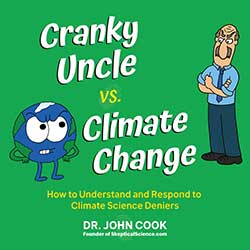
Other Publications
In March 2020 Stephan Lewandowsky and John Cook published The Conspiracy Theory Handbook which has been translated into 9 languages since then. Later in the year, Steve and John assembled a team of 22 authors to write The Debunking Handbook 2020, which is a complete new version taking into account misinformation research published since the initial version came out in 2011. The Conspiracy Theory Handbook even made it into John Oliver's Last Week Tonight which focused on conspiracy theories in its show on July 29 and which has been watched over 9,4 million times since then! Watch the whole episode by clicking on the picture below - or fast forward to about 10:30 where the handbook makes its appearance.
As in previous years, members from our team published articles in various other outlets:
Dana Nuccitelli wrote 15 articles for Yale Climate Connections and 2 articles for Bulletin of the Atomic Scientists. John Cook had one article in the Bulletin of the Atomic Scientists and he and Stephan Lewandowsky published several articles in TheConversation.
Teaching
During the fall semester John Cook and two of his colleagues taught a grad class at George Mason University about climate science and climate communication. A visible outcome of the class for Skeptical Science are the following eight intermediate level rebuttals updated by the students and published during November:
- What were scientists predicting in the 1970s? (Margaret Orr)
- How do human CO2 emissions compare to natural CO2 emissions? (Jensen Sun)
- What is causing the increase in atmospherice CO2? (Erika Harrington)
- Human fingerprints on climate change rule out natural cycles (Kai Huang)
- Positives and negatives of global warming (Sophia Whittaker)
- How much does animal agriculture and eating meat conribute to global warming? (Zack Chester)
- What does past climate change tell us about global warming? (Scott Parker)
- Can aminmals and plants adapt to global warming? (Finley Hay-Chapman)
John Cook created several videos for the grad class which have been included in the Youtube playlist Critical Thinking about Climate. Here is one of them:
Recorded Talks, Podcasts and other outreach activities
Due to the pandemic forcing a lot of presentations and talks online, quite a few of them have been recorded and are now publicly available.
| April 21 | Climate Science on Tap - Climate Change (Mis)Information with John Cook, Heidi Roop, Javin West |
| May 14 | Presentation "Fake News über den Klimawandel erkennen und entlarven" (in German) by Bärbel Winkler |
| June 8 | CBC interview with John Cook about conspiracy theories |
| June 21 | Dave Borlace interview with John Cook on his "Just have a think" YouTube channel. |
| July 21 | Inside Ideas interview with John Cook |
| September 28 | Presentation on California Wildfires and Climate Change by Dana Nuccitelli |
| October 15 | John Cook’s talk for Trinity College “How to fight fake news about climate change” |
| November 11 | Prop watch video interview with John Cook |
| December 9 | Podcast/Video with Intelligent Speculations “Global Warming, Critical Thinking, and Misinformation Inoculation” |
Our MOOC Denial101x
 Denial101x was again available throughout the year as one long-running self-paced version, attracting over 3,000 participants. At the moment, we are inbetween runs in order to "regroup" and to add some new videos before the next self-paced run starts in early February 2021. It will then be available throughout the year until mid-December. Registration is already open on edX.
Denial101x was again available throughout the year as one long-running self-paced version, attracting over 3,000 participants. At the moment, we are inbetween runs in order to "regroup" and to add some new videos before the next self-paced run starts in early February 2021. It will then be available throughout the year until mid-December. Registration is already open on edX.
During this year's run we organized two Zoom calls to give students a chance to ask questions of and interact with members of the course team. Several of the lecturers joined these calls and judging from the reactions during the calls, students appreciated being given such an opportunity.
What started out as a student's comment in our MOOC's discussion forum ended up as neat guest post published on Skeptical Science: Highlighting some expert interviews from Denial101x.
Conferences
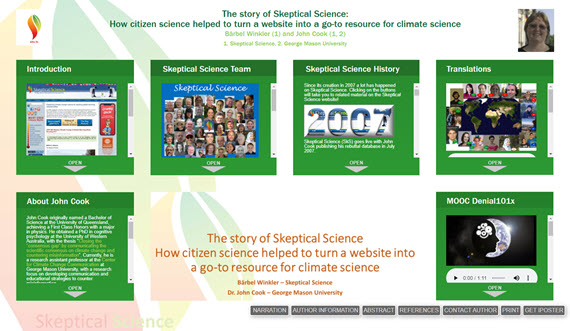 In early May, Bärbel Winkler participated in the virtually held week-long European Geoscience Union's General Assembly where she had a chance to share The story of Skeptical Science in one of the sessions related to citizens' science.
In early May, Bärbel Winkler participated in the virtually held week-long European Geoscience Union's General Assembly where she had a chance to share The story of Skeptical Science in one of the sessions related to citizens' science.
Another opportunity to share our story came about in December during the also virtually held Fall Meeting of the American Geophysical Union (AGU). And while the content was basically the same, the format was completely different as the presentation had to be (re)created as an iPoster. To make this somewhat more "challenging" was the timing as the oral part of the iPoster presentation happened between 1 and 2am in the middle of the night for Bärbel!
Fun stuff
On October 22 a small Skeptical Science team participated for the first time in the annual Quiz organized by Carbon Brief. The event usually takes place at a bar in central London, but this year was held via Zoom due to the COVD-19 restrictions. Because it was held online, over 60 teams and more than 600 participants had joined this fun competition. Over the course of two hours, 5 rounds were played and after a pretty good start for our team with getting 15 out of 20 possible points for general questions, we didn't do quite as well for the "policy" (6) and "energy grid" (8) questions and just made 29 of 60 possible points by halftime. After the break, we managed 16 points in the "science" questions and 11 for "headlines" and we ended up in 45th place with 56 points all told. Simply participating in an event like this is fun, so we plan to do so again next year with a hopefully bigger team to be able to cover a wider range of questions thrown at us! You can read about the event over at Carbon Brief where detailed stats are available as well as all the quiz questions and their answers.
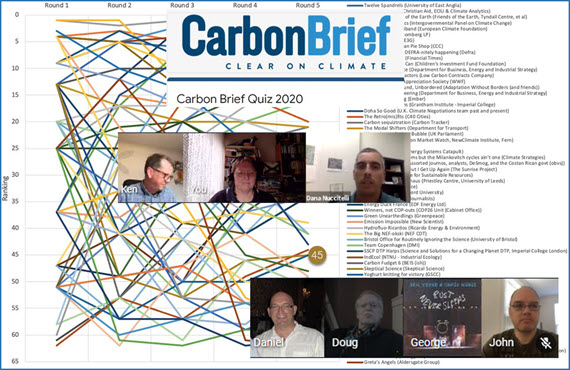 Skeptical Science team: Ken, Bärbel, Dana (was missing when screenshot was taken, so pictures is from another event), Daniel, Doug, Georg and John.
Skeptical Science team: Ken, Bärbel, Dana (was missing when screenshot was taken, so pictures is from another event), Daniel, Doug, Georg and John.
Website activities
During 2020 quite some work was done by our technical team - namely Collin Maessen and Doug Bostrom - to slowly but steadily improve the Skeptical Science website and to update the underlying code to the latest software versions. A lot of these activities went mostly unnoticed but some unfortunately caused some minor outages or misbehaving pages, even though we had done quite extensive testing before flipping the switch. Luckily enough, these issues could be fixed fairly quickly! And while most of the changes are barely noticable for our readers, some of them have visibile impacts, like new icons for our social media presences or a link to directly provide feedback on a rebuttal. To learn more, please check the housekeeping blog posts published in April and December.
You may remember that we had some very good months since September 2019 as far as our website statistics and the unique visitors counted per month are concerned (see last year's write-up). We were able to sustain this until February, but when the Corona pandemic hit during March our stats "tanked" much like the global stock market did:
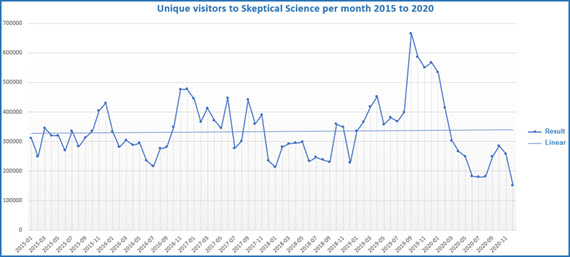 Note: Data for May was incomplete in our stats so the number for this month come from Google analytics instead. Click for larger version or view with stacked years.
Note: Data for May was incomplete in our stats so the number for this month come from Google analytics instead. Click for larger version or view with stacked years.
Blog posts
Several of our blog series kept getting published throughout the year with John Hartz leading the way with his weekly summaries and digests on Saturdays and Sundays. Doug Bostrom published his New Research posts on a weekly basis on Wednesdays. Dana Nuccitelli reposted his articles published in other outlets (see list above) and wrote several original articles for SkS. Several of Zeke Hausfather's CarbonBrief articles were reposted. Other members providing serveral articles were John Cook, Bärbel Winkler and Howard Lee who published a 3-part series about the PETM.
Prompted by a casual exchange on Facebook with climate scientist Katharine Hayhoe, John Mason and John Garrett (jg) teamed up earlier this year to update both the text and the graphics of The Climate Science History article to give credit where credit is due by adding Eunice Foote (1819-1888). She had been investigating the effects of sunlight, using glass tubes containing air and other mixtures of gases – including carbon dioxide. Her results were announced at the 1856 meeting of the American Association for the Advancement of Science, and published in the American Journal of Science and Arts in the same year. The paper was entitled, ‘Circumstances Affecting the Heat of the Sun’s Rays’.
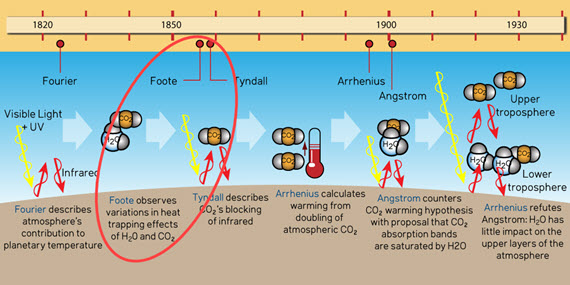 Eunice Foote now makes an appearance in the updated versions of jg's graphics - both in panel 1 as well as the overall graphic.
Eunice Foote now makes an appearance in the updated versions of jg's graphics - both in panel 1 as well as the overall graphic.
Rebuttals
Just like our overall stats, the daily views of our rebuttals also took a pandemic-induced hit as people were obviously pre-occupied with a lot of other stuff for most of 2020. Because of the considerably lower rebuttal views than in previous years in most months, there was also more back-and-forth with regards to most viewed rebuttal during a month and "Consensus" didn't make it to the top spot as regularly as before. In several months it was passed by "Impacts", possibly due to the wildfires raging in many parts of the world.
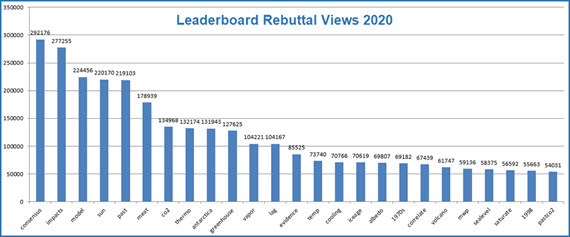
Overall rebuttal views for 25 most viewed rebuttals during 2020. Click for larger version (or here). Monthly "leaderboards" for the 25 most viewed rebutalls have been assembled in this graphic.
All told, the number of views for our rebuttals was obviosly considerably lower than in other years. "Consensus" managed to hang on to first place (290,000+ views), "Impacts" (275,000+) came in 2nd, "Model" third (224,000+), followed closely by "Sun" and "Past" with about 220,000 views each. It's however worth mentioning that since we started to collect detailed rebuttal views in January 2017, the rebuttals have been accessed more than 30 million times all told!
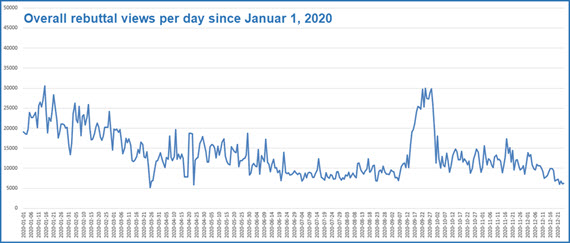 Daily rebuttal views from Jan 1 to Dec 26, 2020. The spike in September coincides with the global climate strike and related activities. Click the image (or here) for a larger version of the graphic.
Daily rebuttal views from Jan 1 to Dec 26, 2020. The spike in September coincides with the global climate strike and related activities. Click the image (or here) for a larger version of the graphic.
Downloads
The Debunking Handbook is still by far the most downloaded of our resources with more than 48,000 downloads of the initial English version published in 2011. Since the new version of the Debunking Handbook was published in October, we however no longer have this information available on Skeptical Science as it's hosted elsehwere without an easy means for us to keep track of the downloads. The various translations got downloaded more than 27,000 times with over 9,000 of those being the initial German version and almost 8,000 downloads of the new version published end of November.
Other notable downloads include the Guide to the Representative Concentration Pathways (RCPs) (almost 15,000) and the Fact-Myth-Fallacy summary (4,000+) with its German version getting downloaded about 5,500 times.
Translations
Translation activities during 2020 were somewhat dominated by the publication of two important and very timely handbooks already mentioned earlier: The Conspiracy Theory Handbook and the The Debunking Handbook 2020. Some of these translations were created by SkS translator teams while others came about due to generous offers from outside our team. That interest in these handbooks has been rather pronounced became clear, when just about a week after first tweeting a link to the German translation of the new Debunking Handbook it had been downloaded more than 6,000 times!
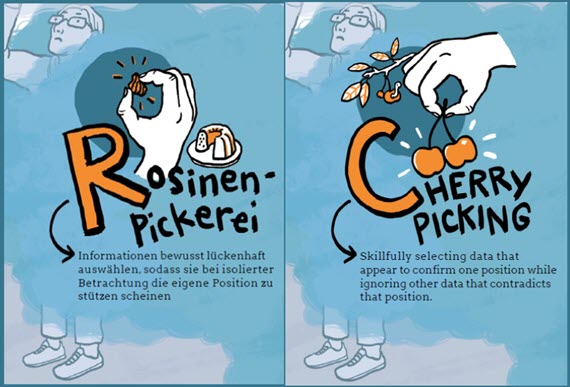
Our thus far most creative translation project is the FLICC-poster we created in collaboration with our German partner site klimafakten.de! As explained in the accompanying blog post this one started out as a German poster and the English version was the first translation completed. A Dutch version is also available and translations into Hungarian, Italian, Portuguese and Spanish have been offered. Will be interesting to see how many different depictions we'll end up with for what is called "Cherry Picking" in English!
A lot of the translation activities on SkS fly somewhat under the radar, so it was high time to shine a spotlight on translations and our teams with a blog post published in June.
Social media
While our Facebook page has been doing fairly well with around 188,000 followers, our misgivings with the platform grew during 2020 as it became more and more apparent, that Facebook wasn't doing nearly enough to rein in misinformation and fake news about many important topics. In order to at least voice and document our stance, we published "A conundrum: our continued presence on Facebook" in July but in the end decided against leaving the platform.
On Twitter we have ca. 22,500 followers, up by about 1,500 compared to a year ago.
Our presence on MeWe, a relatively new social media platform which promises to stay ad- and tracking free has grown considerably during the year and now has more than 1,170 followers. Truth be told however, some of these may be due to folks getting thrown out by Facebook and then misinterpreting the "Skeptical" in our name when they happened upon us on MeWe! How about joining our other Followers on MeWe to increase our base there as we head into 2021?
What to expect for 2021?
We still don't have a crystal ball so your guess is as good as ours, but here are some things which we already know will be happening.
Earlier this year, we started the process to set up Skeptical Science Inc. as a nonprofit organization and have recently submitted our application to the U.S. Internal Revenue Service for 501(c)(3) status. This means that from now, all donations are tax-deductible to the full extent permitted by U.S. law (assuming the IRS approves our application) and our donations page will soon be updated to reflect this change. Once we hear back on our application, we'll make a proper announcement, so this is mainly a heads-up for things to come!
After four years working at the Center for Climate Change Communication (4C) at George Mason University, John Cook will be moving back to Australia in the spring to join the Monash Climate Change Communication Research Hub (MCCCRH) at Monash University. So we’ll have to get used to more of a mouthful as far as his affiliation goes and to more challenging timezone differences! Apart from that, not a lot will change concerning John’s climate communication work: continuing to focus on understanding and countering climate misinformation.
Work on the Cranky Uncle app will continue and there are already plans to add more features as well as to make translations available. So you'll see more about this somewhat cranky party pooper in the upcoming months!

Thanks for reading and all the best for whatever 2021 has in store for us and above all stay safe and healthy!































 Arguments
Arguments





















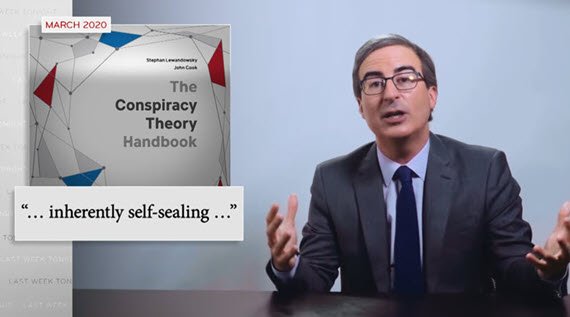
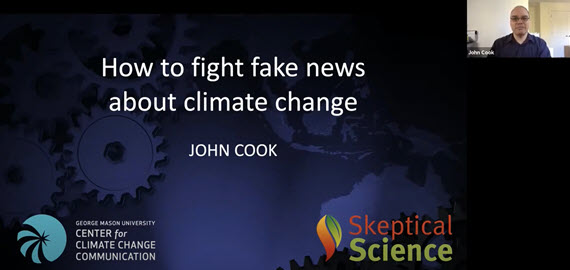
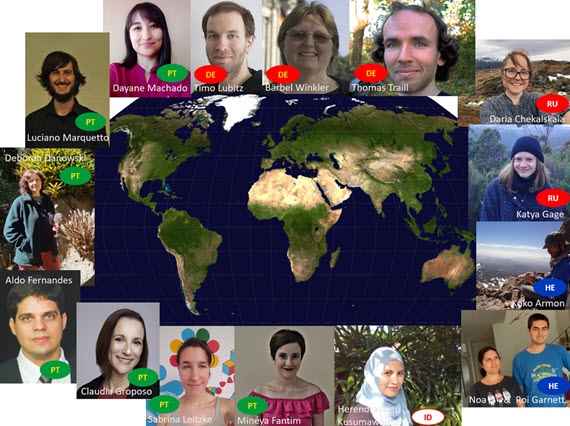










Comments